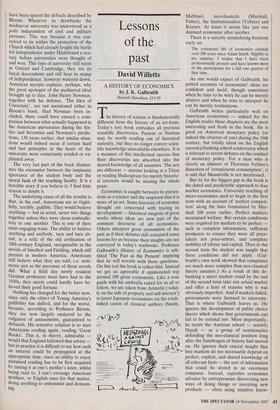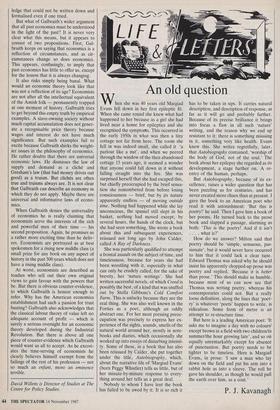Lessons of the past
David Willetts
A HISTORY OF ECONOMICS by J. K. Galbraith Hamish Hamilton, £14.95 The history of science is fundamentally different from the history of an art-form. Today's text book embodies all previous scientific discoveries. Pasteur or Newton may be worth reading out of historical curiosity, but they no longer convey scien- tific knowledge unavailable elsewhere. It is a measure of this intellectual success that their discoveries are absorbed into the shared knowledge of all scientists. The arts are different — anyone looking at a Titian or reading Shakespeare for merely historic- al interests would be missing the whole point.
Economics is caught between its preten- sions as a science and the suspicion that it is more of an art. Some histories of economic thought are concerned with tracing its development — historical exegesis of great works whose ideas are now part of the common discourse of all economists. Others interpret great economists of the past as if their debates still contained some lessons for us because their insights are not conveyed in today's textbooks. Professor Galbraith's History of Economics is sub- titled 'The Past as the Present' implying that he will wrestle with these questions. On this test the book is rather thin. Instead we get an agreeable if opinionated trip around 100 great economists. Like a tour guide with his umbrella raised for us all to follow, we are taken from Aristotle (`solid- ly on the side of property and self-interest') to latest Japanese economists via the estab- lished canon of classical authors (Smith, Malthus), neo-classicals (Marshall, Fisher), the Institutionalists (Veblen) and Keynes. At times it seems like just one damned economist after another.
There is a suitably intimidating footnote early on:
The systematic life of economics extends over 200 years since Adam Smith. Slightly to my surprise, I realise that I have been professionally present and have known most of the participants for a full one quarter of that time.
As one would expect of Galbraith, his potted accounts of economists' ideas are confident and lucid, though sometimes when he tries to be witty he can be merely abusive and when he tries to interpret he can be merely tendentious.
Galbraith writes particularly well on American economists — indeed for the English reader these chapters are the most interesting and fresh in the book. He is good on American monetary policy (or indeed the absence of one) during the 19th century, but totally silent on the English currency/banking school controversy which is relevant to recent debates on the conduct of monetary policy. For a man who is clearly an admirer of Thorstein Veblen's dissection of 'conspicuous consumption', it is odd that Mandeville is not mentioned.
But by far the biggest gap in the book is the dated and predictable approach to free market economics. University teaching of micro-economics used to begin in the first term with an account of 'perfect competi- tion' along the lines formulated by Mar- shall 100 years earlier. Perfect markets maximised welfare. But certain conditions were required for markets to be perfect such as complete information, sufficient producers to ensure they were all price- takers not price-setters, and complete mobility of labour and capital. Then in the second term the student was taught that these conditions did not apply. (Gal- braith's own work showed that companies are much more complex than neo-classical theory assumes.) As a result of this de- bunking a smart student could by the end of the second term take any actual market and offer a host of reasons why it was obviously imperfect. And if markets failed, governments were licensed to intervene. That is where Galbraith leaves us. He ignores the development of public choice theory which shows that governments can fail to be rational too. More importantly, he treats the Austrian school — notably Hayek — as a group of reactionaries defending the neo-classical position long after the bandwagon of history had moved on. He ignores their crucial insight that free markets do not necessarily depend on perfect, explicit, and shared knowledge of all relevant facts — the sort of information that could be stored in an enormous computer. Instead, capitalist economies advance by entrepreneurs discovering new ways of doing things or inventing new products — often using intuitive know- ledge that could not be written down and formalised even if one tried.
But what of Galbraith's wider argument that all past economics must be understood in the light of the past? It is never very clear what this means, but it appears to consist of two propositions. First, Gal- braith keeps on saying that economics is a reflection of circumstances, and as cir- cumstances change so does economics. This appears, confusingly, to imply that past economics has little to offer us, except for the lesson that it is always changing.
It also risks simply being banal. What would an economic theory look like that was not a reflection of its age? Economists are not after all the intellectual equivalent of the Amish folk — permanently trapped at one moment of history. Galbraith tries to get beyond this empty truth by empirical examples. A slave-owning society without much capital accumulation does not gener- ate a recognisable price theory because wages and interest do not have much significance. But such examples fail to excite because Galbraith shirks the weight- ier issues in the philosophy of economics. He rather doubts that there are universal economic laws. He dismisses the law of supply and demand as a cliché and Gresham's law (that bad money drives out good) as a truism. But clichés are often true and truisms always are. It is not clear that Galbraith can describe an economy in which they do not apply. Maybe there are universal and informative laws of econo- mics.
When Galbraith denies the universality of economics he is really claiming that economists serve the interests of the rich and powerful men of their time — his second proposition. Again, he promises us a rather more exciting time than he deliv- ers. Economists are portrayed as at best spokesmen for a rising new middle class (a small prize for any book on any aspect of history in the past 500 years which does not have a rising middle class).
At worst, economists are described as toadies who sell out their own original views to gain favour with the powers that be. But there is obvious counter-evidence, to which Galbraith is honest enough to refer. Why has the American economics establishment had such a passion for trust busting? Galbraith also acknowledges that the classical labour theory of value left no adequate account of profit — which is surely a serious oversight for an economic theory developed during the Industrial Revolution. But there is above all one piece of counter-evidence which Galbraith would want us all to accept. As he excori- ates the time-serving of economists he clearly believes himself exempt from the failings of the rest of his profession — not so much an enfant, more an eminence terrible.











































































 Previous page
Previous page